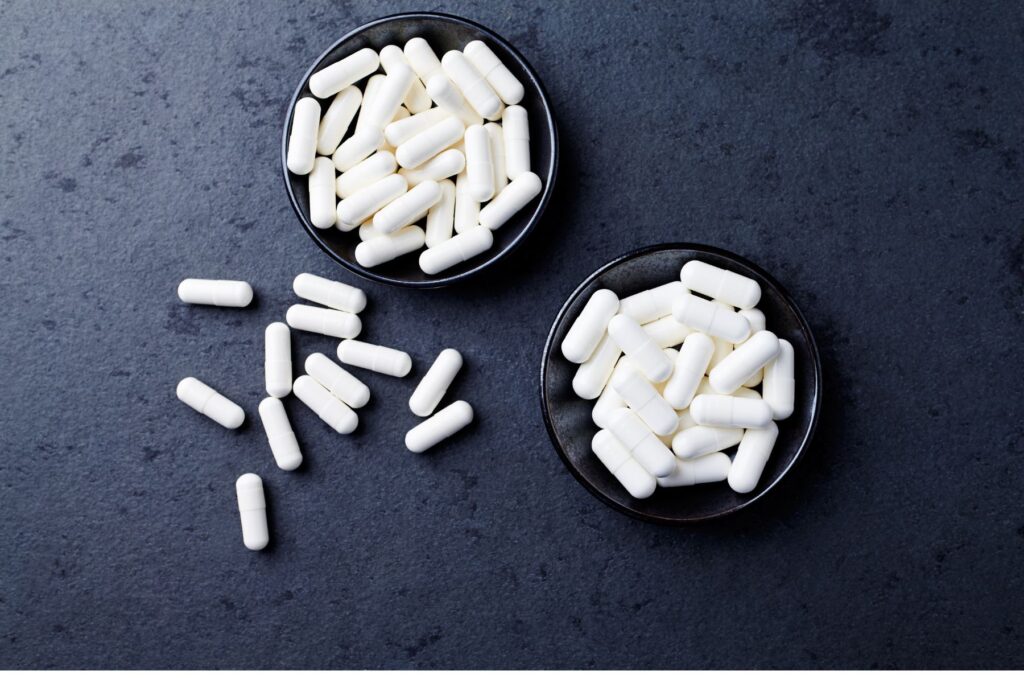Creatine for Active Women – Is Creatine for Women Helpful?
December 4, 2023

Creatine is a commonly talked about supplement within the sport and fitness community. Why is this supplement so popular and does it actually have any benefits? Let’s talk about it.
What is Creatine?
Creatine is one of the most well researched and widely used nutrition supplements.
It’s well known for its performance benefits, specifically for short term high intensity exercise as well as increases in muscle strength and mass. Research has shown it may also help with exercise recovery and injury prevention.1 New potential benefits of creatine supplementation are constantly emerging including its impacts on brain health, bone density, and even mood.
Many people are aware of these potential benefits of creatine supplementation but some may not know what exactly what it is. Creatine is a naturally occurring compound in the body that can either be obtained from the diet or synthesized by your body from amino acids.2,3 Once it is synthesized it’s released into the blood to be transported to tissues.2 A majority of the body’s creatine, 95% to be exact, is found in skeletal muscle and the remaining 5% is found in the brain and other tissues.1,2
Not only are creatine supplements a well-studied and potent performance aide , they are also widely available and relatively inexpensive compared to other performance supplements on the market.
Benefits for Exercise Performance

Creatine, as a part of the molecule phosphocreatine, is key for energy production and availability in the muscle via its role in the resynthesis and availability of adenosine triphosphate (ATP. ATP is the main energy source for muscle contractions during short duration high intensity exercise.
Creatine supplements have been shown to increase muscle creatine concentration and thus impact an athlete’s capacity to perform short term high intensity exercise like sprints and weight lifting. Supplementation also plays a key role in increasing muscle strength and lean muscle mass especially when combined with resistance exercise.1 Other possible performance benefits include greater training tolerance, improved muscular endurance, and recovery improvements such as reduced muscle damage.1
Benefits of Creatine for Brain Health

In recent years creatine research has expanded into areas like brain health. It has shown some possible benefits for both cognitive function and memory , especially during times of high stress like sleep deprivation.4
The positive effects of creatine supplementation on mood is an emerging area of research and interest for many athletes and recreational exercisers. Supplementation can offer neuroprotective benefits and thus research continues to be published on its positive effects for those who have experienced a TBI or concussion.1
Benefits for Active Females
Along with its potential benefits for brain health, mood, muscle strength, and lean muscle mass accrual, the effects of creatine supplementation on bone health is of particular importance for many active females.
As we age , bone loss occurs resulting in a decrease in bone mineral density. This can impact bone strength and increase risk for bone injuries or bone related diseases (osteoporosis) as we age. Research has shown that women, especially those engaging in resistance exercise, who supplement with creatine have increases in bone mineral density.5 Post-menopausal women are a group in which this effect is especially impactful.
Dietary Sources vs Supplementation

For an active female eating a normal diet, she will consume approximately 1-2 grams per day of creatine.1 This is mainly from foods high in the compound like milk, beef, pork, tuna, and salmon. The body also makes some of its own creatine. However, for many people it’s difficult to attain the dose needed for health and performance benefits from these two routes alone.
Another interesting fact is that for this same active female eating a normal diet consuming approximately 1-2 grams of creatine, their muscle stores will only be approximately 60-80% saturated.1 This means that supplementation in this female has the ability to increase muscle creatine concentration to reach 100% saturation, increasing the likelihood of attaining the performance and health benefits as discussed above.
Creatine monohydrate is the most widely studied and most effective form of creatine supplement. To decide if this supplement is right for you speak with your doctor or sports dietitian!
As always we recommend brands that are third party tested for purity and safety like Thorne’s or Klean Athletes creatine monohydrate supplements. Some clients have asked us about gummy supplements. Research is still ongoing if something like gummies can be as effective as a monohydrate powder.
If you’re looking for a sports dietitian to help you optimize your performance, health, recovery, and sleep through optimizing your fueling, supplementation, and hydration plan, we’re here to help. Check out our performance packages here.
References:
2. Gropper, S., Smith, J. (2013). Advanced Nutrition and Human Metabolism. (6th edition). Wadsworth Cengage Learning.